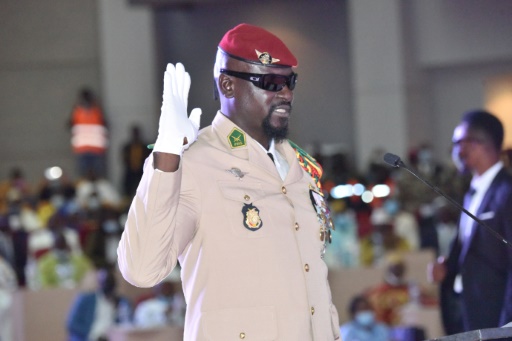
[ad_1]
Colonel Mamady Doumbouya, who claimed power in Guinea following a military coup on September 5, on Wednesday appointed development veteran Mohamed Beavogui prime minister in a decree read on public television.
Beavogui, 68, has had a prestigious career in international organizations, including the UN, but has no experience in national government, potentially keeping him away from Guinean political wrangling in recent years.
Son of a diplomat, the graduate engineer is an expert in the financing of agricultural development and risk management.
Doumbouya pledged earlier this month to honor the country’s international commitments during the transition to civilian rule as he was sworn in as interim president.
He had led the overthrow of President Alpha Condé on September 5.
Doumbouya was sworn in before Supreme Court President Mamadou Sylla for an indefinite transitional period on October 1.
The new interim president has expressed his “commitment” that neither he nor any member of the junta will stand in the future elections that the army has promised to organize after the transition period.
The mission of his administration, he said, was to “rebuild the state” by drafting a new constitution, fighting corruption, reforming the electoral system and then organizing “free, credible and transparent” elections. .
After taking the oath, he undertook in a message to the nation to appoint a Prime Minister followed by a government and other “organs of the transition”.
He also announced the creation of an anti-corruption body.
The September 5 coup, the latest episode of turmoil in one of Africa’s most unstable countries, saw the overthrow of President Condé, 83.
The deposed leader is being held in an undisclosed location.
The coup plotters took control in just a few hours, with media reporting between 12 and 20 people losing their lives.
Condé became the first democratically elected president of Guinea in 2010 and was re-elected in 2015.
But last year, he passed a controversial new constitution that saw him run for a third term in October 2020.
The move sparked mass protests in which dozens of protesters were killed. Condé was re-elected, but the political opposition maintained that the poll was a sham.
Guinea is one of the poorest countries in the world, despite having abundant mineral reserves, including iron ore, gold and diamonds.
The former French colony also has the world’s largest reserves of bauxite, the main source of aluminum. Mining is the engine of the economy.
Source link